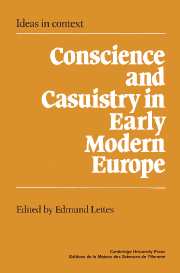Book contents
- Frontmatter
- Contents
- Notes on contributors
- Introduction
- 1 Governing conduct
- 2 Laxity and liberty in seventeenth-century English political thought
- 3 Casuistry and character
- 4 Prescription and reality
- 5 The ‘new art of lying’: equivocation, mental reservation, and casuistry
- 6 Kant and casuistry
- 7 Moral arithmetic: Seven Sins into Ten Commandments
- 8 Optics and sceptics: the philosophical foundations of Hobbes's political thought
- Index
2 - Laxity and liberty in seventeenth-century English political thought
Published online by Cambridge University Press: 13 October 2009
- Frontmatter
- Contents
- Notes on contributors
- Introduction
- 1 Governing conduct
- 2 Laxity and liberty in seventeenth-century English political thought
- 3 Casuistry and character
- 4 Prescription and reality
- 5 The ‘new art of lying’: equivocation, mental reservation, and casuistry
- 6 Kant and casuistry
- 7 Moral arithmetic: Seven Sins into Ten Commandments
- 8 Optics and sceptics: the philosophical foundations of Hobbes's political thought
- Index
Summary
These Cases of Conscience have spoyled the World
by these doctrines a man is taught how to be an honest thief,… and by these we may not only deceive our brother, but the law; and not the laws only, but God also.
Since their first appearance in English in the seventeenth century, the words ‘casuist’ and ‘casuistry’ have generally carried the pejorative connotation, namely ‘Subtility of wit with a chiverell conscience’; the ‘subtill distinctions of the most learned’, exploited in such a way as to make ‘foule sinnes to passe along as no sinnes’. That only ‘the Want of Conscience, makes the Case of Conscience’ became something of a commonplace; ‘Men usually set themselves to justifie what they do and love to do’, exploiting their reason in order to ‘argue and dispute in defence of those lusts which they are loath to part with’. So too in seventeenth-century French usage ‘casuiste’ and ‘casuistique’ came to imply sophistry in the service of sin, ‘des excuses à la mauvaise cupidité’, ‘raffiner’ sins out of existence, the ‘art of cavilling with God’, in Pierre Bayle's Dictionnaire historique et critique of 1696. ‘Pleaders in the court of conscience find out more distinctions and subtleties than the pleaders in the civil law-courts’, Bayle complained; morality ought instead to be the simple product of ‘good sense, and… the light which the reading of the gospel darts into the mind’.
- Type
- Chapter
- Information
- Conscience and Casuistry in Early Modern Europe , pp. 72 - 118Publisher: Cambridge University PressPrint publication year: 1988
- 12
- Cited by

